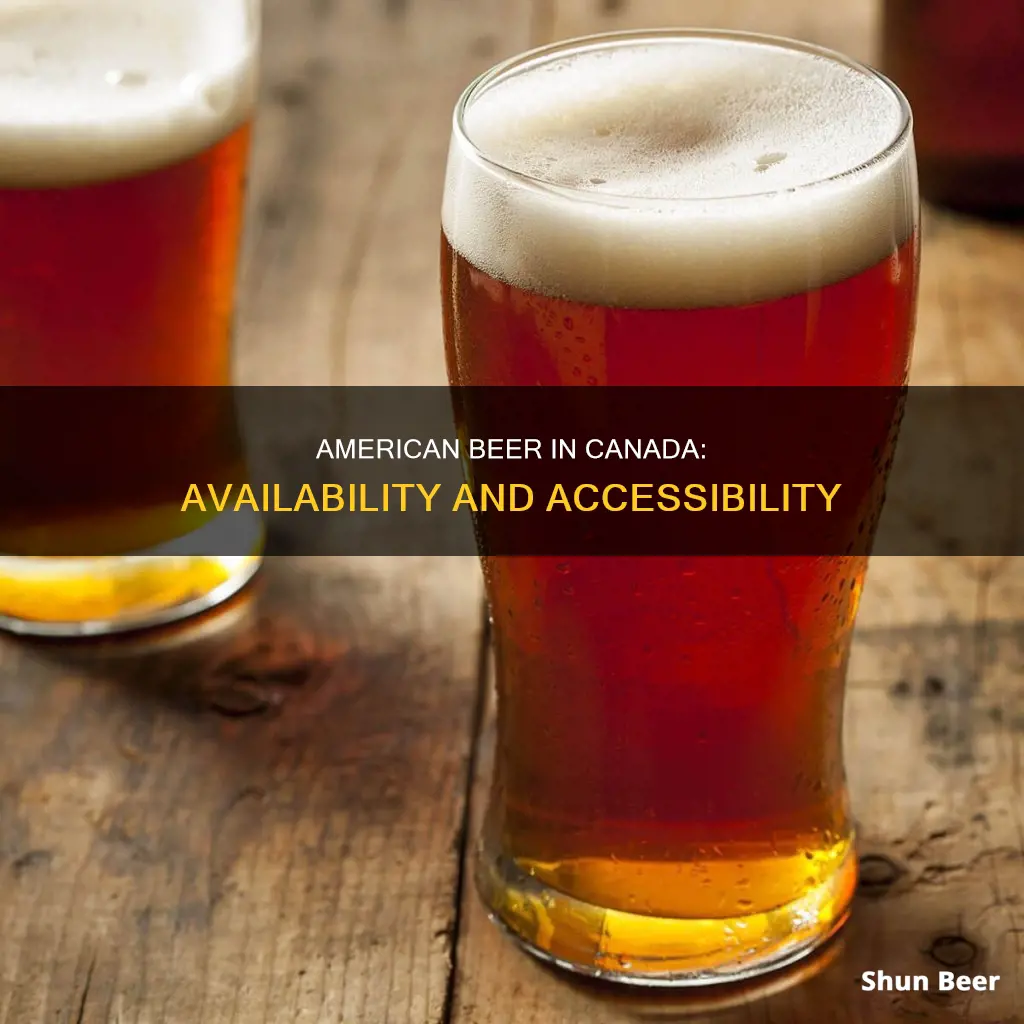
Canada has strict regulations on the sale of alcohol, including beer. Beer and liquor are generally sold through specialised stores, except in Quebec, where beer and wine can be purchased from grocery and convenience stores. In Ontario, beer can be bought at The Beer Store or at government-owned LCBO outlets. In British Columbia, there is a mixed system of government-owned and private outlets, and beer can also be purchased at breweries, bars, restaurants, and rural grocery stores. Alberta has a fully private system, and Saskatchewan has a mixed system of government-owned and privately-operated outlets. Manitoba has a similar system to British Columbia, with the addition of some private stores attached to hotels.
| Characteristics | Values |
|---|---|
| Can you buy American beer in Canada? | Yes, but it must be declared and you may have to pay duties and taxes. |
| How much beer can you bring into Canada? | Approximately 24 cans or bottles (355 ml each) of beer or ale. |
| How long can you stay in the US before having to pay duties and taxes on beer brought into Canada? | 48 hours |
| What is the minimum age to bring beer into Canada? | 18 years for Alberta, Manitoba and Quebec and 19 years for the remaining provinces and territories. |
| Where can you buy beer in Canada? | Beer can be bought at The Beer Store, government-owned LCBO outlets, and privately-owned agency stores of the LCBO in rural communities. Beer is also sold at grocery and corner stores in Quebec and at some grocery stores in Ontario. |
What You'll Learn

Buying American beer in Canada: Duty and taxes
If you are planning to buy American beer in Canada, there are a few things you should know about the duty and taxes you may have to pay. The duty and taxes on imported goods are collected by the Canada Border Services Agency (CBSA) on behalf of the Government of Canada. The rates of duty are established by the Department of Finance Canada and can vary depending on trade agreements.
Firstly, it's important to understand the concept of personal exemptions. If you are a Canadian resident returning from a trip outside Canada, a former resident moving back to Canada, or a temporary resident returning from a trip outside the country, you may qualify for a personal exemption. This allows you to bring goods up to a certain value into Canada without paying the regular duty and taxes. The length of your absence from Canada determines your eligibility and the value of goods you can bring back.
If you have been outside Canada for less than 24 hours, personal exemptions do not apply. For absences of more than 24 hours, you can claim goods worth up to CAN$200, excluding tobacco products and alcoholic beverages. For absences of 48 hours or more, you can claim goods worth up to CAN$800, and this time, you can include alcoholic beverages and tobacco products within prescribed limits. Specifically, you are allowed to import up to 8.5 litres of beer duty-free. For absences of more than 7 days, the same CAN$800 limit applies, and you must have the alcoholic beverages with you when entering Canada.
It's worth noting that certain alcoholic beverages with less than 0.5% alcohol by volume are not considered alcoholic beverages and are exempt from these limits. Additionally, no duty is payable on goods imported for personal use if they are marked as "made in Canada, the USA, or Mexico" or if there is no marking indicating they were made elsewhere.
When bringing American beer into Canada, you will need to pay attention to the applicable import duties and taxes. While there is no import duty on beer, you may be subject to excise duties and taxes. The cost will depend on the size of the bottle, the country of origin, the retail price, and the current exchange rate. The CBSA will convert the retail price from the original currency into Canadian dollars when you arrive at the border.
In summary, when purchasing American beer in Canada, be mindful of the personal exemptions and duty-free limits that apply based on your length of absence from Canada. Ensure you have the necessary documentation and be prepared to pay any applicable import duties and taxes upon entry.
Where to Buy Beer in Statesville, North Carolina?
You may want to see also

Beer limits for bringing into Canada
If you're planning to bring beer into Canada, there are a few things you need to keep in mind. Firstly, it's important to know the limits and regulations to avoid any issues when crossing the border. Here's a detailed guide to help you navigate the process:
Time Away from Canada:
The amount of beer you can bring into Canada duty-free depends on how long you've been away from the country. If you've been away for less than 24 hours, there are no personal exemptions for cross-border shoppers. However, if you've been away for 24 to 48 hours, you're allowed to bring in goods worth up to CAD 200 without paying any duty or taxes. This does not include alcoholic beverages.
48 Hours or More:
When you've been away from Canada for 48 hours or more, you're allowed to bring in larger quantities of alcohol duty-free. Specifically, you can import up to 1.5 litres of wine, two 750 ml bottles of wine, or one large standard bottle of liquor. In terms of beer, the limit is approximately 24 cans or bottles (355 ml each), which is equivalent to about 8.5 litres.
Meeting Minimum Age Requirements:
It's important to note that you must meet the minimum age requirements of the province or territory where you enter Canada. The minimum age is 18 years for Alberta, Manitoba, and Quebec, while it's 19 years for all other provinces and territories. Make sure you're aware of the specific age restrictions for your entry point.
Provincial and Territorial Limits:
The quantities of alcoholic beverages you can import are also governed by the limits set by the provincial and territorial liquor control authorities of your entry point. If you plan to bring in more alcohol than the personal exemption allows, you'll need to pay the applicable duty, taxes, and provincial or territorial levies. It's recommended to contact the appropriate provincial or territorial liquor control authority before your trip to understand their specific regulations.
Declaring Your Goods:
When entering Canada, it's crucial to declare all the goods you're bringing in, including alcoholic beverages. Being honest and accurate in your declaration can save you potential issues and delays. While some travellers have reported varying experiences with border guards, it's always best to follow the regulations to avoid fines and future scrutiny.
In summary, bringing American beer into Canada is permissible as long as you adhere to the specified limits and regulations. Always check for the most up-to-date information from official Canadian government sources to ensure a smooth border crossing experience.
Buying Beer in Oklahoma: Sunday Shopping Laws Explained
You may want to see also

Shipping alcohol to Canada
For individuals, the rules vary depending on how long you've been away from Canada. If you've been away for less than 24 hours, there are no personal exemptions for cross-border shoppers. After 24 to 48 hours, you can claim goods worth up to CAD$200 without paying duty and taxes, but this exemption does not include tobacco products and alcoholic beverages. After 48 hours or more, your exemption limit increases to CAD$800, and you can bring specific amounts of alcohol duty-free:
- Up to 1.5 litres of wine
- Up to 53 fluid ounces or two 750 ml bottles of liquor
- Up to 40 fluid ounces or one large standard bottle of liquor
- Approximately 24 cans or bottles (355 ml each) of beer or ale, which is equivalent to 8.5 litres
To bring alcohol into Canada, you must meet the minimum age requirement of the province or territory where you enter. The minimum age is 18 years for Alberta, Manitoba, and Quebec, and 19 years for all other provinces and territories.
Now, for shipping alcohol to Canada as a business, the rules are more stringent. According to UPS, only approved customers who are licensed to ship alcohol can utilise their alcohol shipping services within Canada and internationally. Shippers must possess a valid retailer, vintner, brewer, or distiller licence in their home province and enter into a contract with UPS for alcohol transportation.
Additionally, the Canada Post website mentions that you can only ship intoxicating beverages in Canada if you're a Parcel Services contract customer or a Solutions for Small Business (SfSB) cardholder. They also outline specific eligibility criteria for shippers, which include being a provincial liquor board, a manufacturer or distributor of such beverages, or an individual receiving the shipment within the same province.
Furthermore, special restrictions apply to the alcohol content and volume of intoxicating beverages. For instance, if the beverage has up to 70% alcohol by volume, it can be shipped by air or ground in a container of 5 litres or less. Additionally, the alcohol content of imported beverages must not exceed 24% by volume.
In conclusion, shipping alcohol to Canada is subject to various regulations, and it's important to adhere to these rules to avoid legal consequences. Individuals bringing alcohol into the country have specific duty-free allowances, while businesses shipping alcohol must comply with licensing and contractual requirements.
Buying Beer: Age Verification and Alcohol Purchases
You may want to see also

Alcohol limits for bringing into Canada
When bringing alcohol into Canada, you must declare all goods to a border services officer and answer their questions truthfully. This includes alcohol purchased at duty-free shops. The Canada Border Services Agency (CBSA) classifies "cooler" products according to the alcoholic beverage they contain. For example, beer coolers are considered beer, and wine coolers are considered wine.
Alcoholic beverages are defined as products that exceed 0.5% alcohol by volume. If you have been outside of Canada for 48 hours or more, you are allowed to import one of the following amounts of alcohol free of duty and taxes:
- Up to 1.5 litres of wine (or 53 fluid ounces)
- Two 750 ml bottles of wine (or 40 fluid ounces)
- One large standard bottle of liquor (up to 287 fluid ounces)
- Approximately 24 cans or bottles (355 ml each) of beer or ale (or 8.5 litres)
If you are a visitor to Canada, you may bring in more alcoholic beverages than the amounts listed above, but you will be responsible for paying duty and taxes on the additional alcohol you are bringing into the country. The quantities of alcoholic beverages you can import must be within the limit set by the provincial and territorial liquor control authorities that apply where you will enter Canada. If you exceed your personal exemption, you will be required to pay any applicable duties, taxes, and provincial or territorial levies.
The minimum age to bring alcohol into Canada varies by province and territory. It is 18 years for Alberta, Manitoba, and Quebec, and 19 years for all other provinces and territories.
Buying Beer Early in Tennessee: What's the Legal Morning Limit?
You may want to see also

Canadian beer companies
Canada has a rich history of brewing, with its first brewery opening in 1647. Today, there are over 1,300 licensed breweries in the country, and many popular brands to choose from. Here is a list of some of the most notable Canadian beer companies:
Labatt Brewing Company
Labatt is one of Canada's oldest and most popular beer brands, founded in 1847 by John Kinder Labatt in Ontario. The company produces a range of beers, the most famous of which is Labatt Blue, which is considered the world's best-selling Canadian beer. Labatt was purchased by Interbrew in 1995 and is now owned by Anheuser-Busch InBev.
Molson Coors Brewing Company
Molson is another iconic Canadian beer brand and the oldest brewery in North America, founded in 1786 by John Molson. The company has a range of beers, including Molson Canadian, Molson Stock Ale, and Molson Export. Molson merged with Coors in 2005 to form Molson Coors Brewing Company, and their beers are widely distributed and easy to find in stores.
Sleeman Breweries
Sleeman is Canada's third-largest national brewer, owned by the international brand Sapporo. Sleeman offers a range of beer styles, including Cream Ale, Original Lager, and Honey Brown Lager. The company is based in Guelph, Ontario, and has been in operation since the 1980s.
Moosehead Breweries
Moosehead is the last major brewery in Canada that is still wholly Canadian-owned. The company has been run by the Oland family in Saint John, New Brunswick, since 1867. Moosehead's Canadian Lager is their most famous beer, known for its crisp and refreshing taste.
Amsterdam Brewery
Amsterdam Brewery is a popular craft beer brand based in Toronto, offering a range of flavours. Their Boneshaker IPA is particularly notable, with a high ABV of 7.1%. The brewery was established in 1986 and is now owned by Royal Unibrew, a Danish company.
Alexander Keith's Brewery
Alexander Keith's is another historic Canadian beer brand, with the brewery being bought by Alexander Keith in Halifax, Nova Scotia, in 1820. The company offers a wide range of styles, including an IPA, light ale, blonde ale, and red ale. Alexander Keith's is also now owned by Anheuser-Busch InBev.
Unibroue
Unibroue is one of Quebec's most recognisable breweries, specialising in Belgian-style beers. The company was founded by André Dion, who attempted to unite Quebec's smaller breweries to help them achieve distribution across Canada. Unibroue's most famous beer is La Fin du Monde, a Belgian tripel-style beer that has won numerous international awards.
These are just a few examples of the many Canadian beer companies that have made their mark on the country's brewing industry. Each company has its own unique history and range of beer offerings, contributing to Canada's diverse and thriving beer culture.
Best Places to Buy Redbridge Beer
You may want to see also
Frequently asked questions
Yes, you can buy American beer in Canada. However, the availability of American beer may vary depending on the province or territory you are in. In general, you can find a wide range of alcoholic beverages, including American beer, at government-owned liquor stores, private outlets, and rural grocery stores.
There are a few options for purchasing American beer in Canada. You can visit government-owned liquor stores, private retailers, or rural grocery stores that sell alcohol. Additionally, some bars and restaurants offer off-sale products, and you can also purchase beer directly from breweries.
Yes, there are some restrictions to keep in mind. The legal drinking age varies across Canada, so you must meet the minimum age requirement of the province or territory where you are purchasing alcohol. Additionally, there may be limits on the amount of alcohol you can import into Canada duty-free, and you may need to pay duties and taxes if you exceed these limits.
While the selection may vary, some popular American beers that are available in Canada include Budweiser, Coors Light, Miller Lite, and Samuel Adams Boston Lager. These beers are often sold at liquor stores and retailers across the country.







